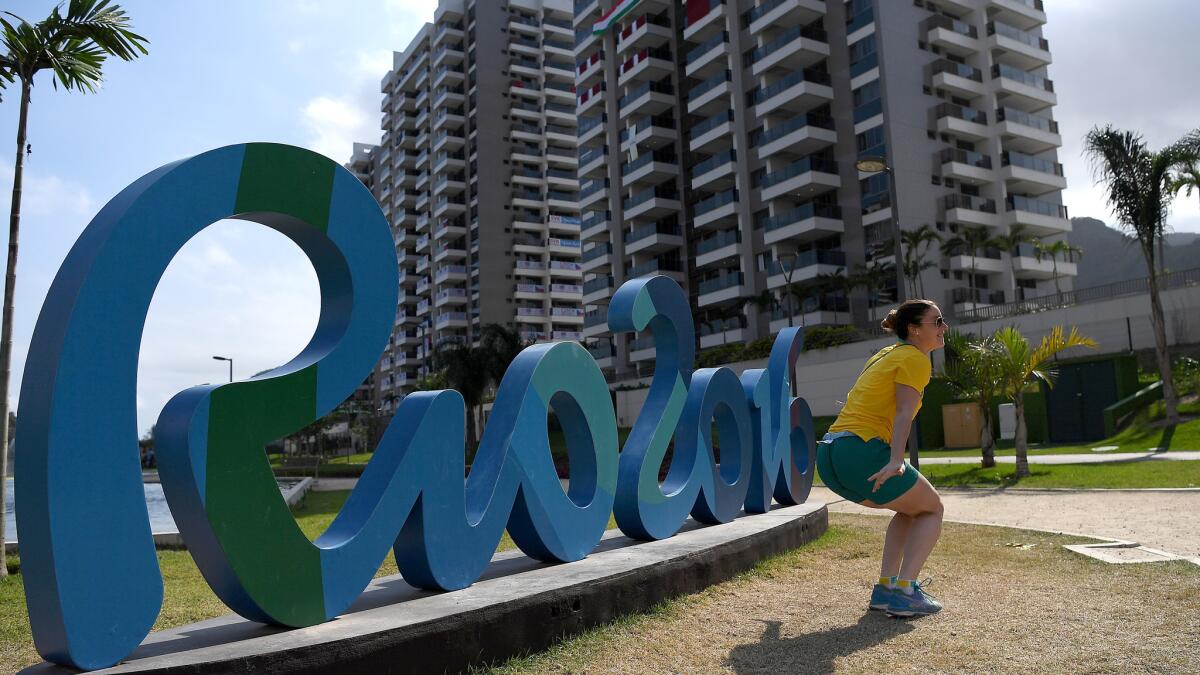The decision for the village people: Should they stay or should they go?

- Share via
Reporting from Rio de Janeiro — It was moving day at the Olympic village Thursday and Michelle Carter had more than just a gold medal to pack.
“I was going to take this to the post office,” she said, clutching at the blue and green bedsheet she had tried to mail home. “But they don’t have a box big enough.”
Carter, the women’s shot put champion, was leaving Rio de Janeiro four days before Sunday’s closing ceremony. And she isn’t the only U.S. athlete who has decided to exit early.
The Americans came into these Olympics with more than 550 athletes, the largest delegation in the Rio Games. But nearly half of them have already left.
The swimming and tennis teams are long gone; so are the men’s and women’s rugby teams, with the exception of men’s captain Madison Hughes. The women’s soccer team, meanwhile, never made it to Rio and the rooms that were reserved for them.
But you don’t have to knock on doors to find out the village has cleared. Just look at the line in front of the McDonald’s, where a 30-minute wait for a free burger and fries was common a week ago.
“I can see the line is shortening,” said Teofimo Lopez, who boxes for Honduras. “A lot of people left.”
At the start of the Games, the Olympic village’s population of more than 17,000 would have made it the fourth-biggest city in Alaska. And at 252 acres, this village is larger than New York’s Greenwich Village.
It truly is a self-contained city, with its own streets, bus routes, post office and 2 1/2 miles of bike lanes. There are shops, cafes, a dining hall, a state-of-the-art gym and a multifaith worship center with meditation rooms, religious items and a compass pointing the way to Mecca.
Athletes are housed in 31 identical 17-story buildings, in Spartan, no-frills apartments of two, four or six bedrooms — each with two simple, hard beds, a tiny nightstand, an oscillating fan and a mirror.
Who gets which rooms is often determined by national team or sport.
“The basketball players, they are big people,” said one Rio Games official, “so they need space.”
The organizing committee for the Rio Games pays for the housing and most of the services inside the village, meaning the athletes stay for free.
Not all of them stay there, though. Both U.S. basketball teams are staying on a cruise ship anchored in Rio’s harbor. The wrestling teams, which kept their assigned rooms in the village, spent most of their time at the Lonier High Performance Training Center. And most members of the U.S. tennis team found their own accommodations.
Some U.S. athletes are still there, though. As of Wednesday night the entire boxing team remained, even though just two fighters are still competing. Seven members of the shooting team were also in the village, along with most of the fencing team and five of the six members of the table tennis team.
The athletes are generally allowed to choose whether to leave when their competition ends or stay until the conclusion of the Games on Sunday.
“Every sport is different,” said Julie Goldsticker, longtime press officer for USA Boxing. “I know some athletes in other sports are already back in the States. In London, a lot of the boxers left early after they lost. But all of our athletes are staying for the duration this time around, which is nice.”
Judoka Kayla Harrison, who won a gold medal Aug. 11, said she decided to stay to wring every possible memory out of her Olympic experience.
“Walking in the closing ceremonies will signify the end of what has been an emotional and lifelong journey,” she said. “I’m sure it will be bittersweet but I wouldn’t miss it for anything.”
Lopez, the boxer for Honduras, said one of his best village memories was seeing NBA star Tony Parker, who is playing with the French national team here. But the village has quieted as it emptied, he said.
“There’s not that much noise anymore,” said Lopez, who plans to stay until Aug. 24, when the village closes. “People are starting to finish their Games.”
For those who stay past the end of their events, there’s an unwritten protocol that must be followed out of respect for those still competing.
“We know quiet time starts at 10 o’clock, so everybody starts dialing it down,” Carter said. “We definitely don’t want to get in others’ way while we’re competing.”
And because the Olympic village is the world’s largest international melting pot, Carter says that respect knows no national boundaries.
“It’s fun to interact with each other,” said Carter, a three-time Olympian who said many of the athletes pass the time in village trying to guess each other’s sport.
“Everybody just looks so different,” she said. “It’s cool because here everybody has the same goal. We’re all competing for our countries. We’re all coming down here to do our best. And we all are the best athletes in our own countries.
“It’s a great feeling to see everybody working so hard.”
Twitter: @kbaxter11
More to Read
Go beyond the scoreboard
Get the latest on L.A.'s teams in the daily Sports Report newsletter.
You may occasionally receive promotional content from the Los Angeles Times.





